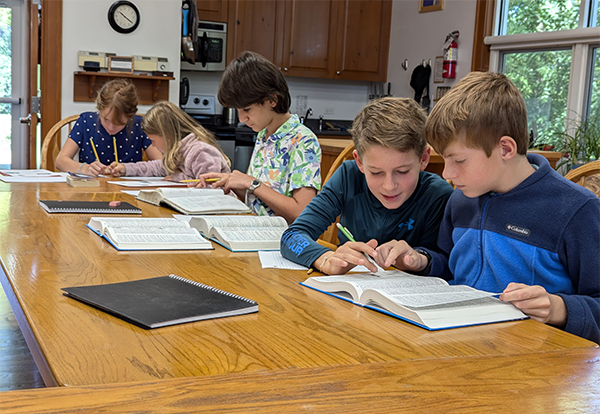
Executive Functioning: A set of essential life skills
Research tells us that executive functioning skills are an important predictor of positive adult outcomes. They are the foundation for a productive and well-functioning life. These skills matter more than social class, measurements of intelligence, or even mistakes made during childhood and adolescence (Moffitt, et al, 2011). Executive functioning refers to the set of mental and emotional skills necessary to plan effectively, initiate and complete tasks, and solve problems. Developing these skills is a crucial part of living in a meaningful and purposeful way.
As parents and educators have come to understand how important executive functioning is for a successful adult life, it has become the focus of many conversations and goals for educational practices. Schools have sought to integrate applications into their curriculum, and practitioners offer tutoring and workshops on developing these habits for children and adults. As more research is conducted on the relationship between executive functioning and educational practices, it has become clear that Montessori uniquely supports the development of these important life skills.
A systematic review examining academic and non-academic effects of a Montessori education revealed that (along with other positive effects) Montessori has a positive effect on executive functioning (Randolph, et al, 2023). People who have attended a Montessori school have, on average, greater executive functioning than those who have attended only conventional schools.
Children in Montessori classrooms have up to three hours of uninterrupted work time; they choose what they will do and how long they will do it; they experience regulating their emotions when they concentrate deeply; and, as they get older, they propose projects to work on, determine the scope of the project, and then have time to follow through with all parts of the task. These, and many other qualities of the Montessori approach, all support development of executive functioning.
But what are the skills that make up executive function skills? How do these skills show up in Montessori alumni? And how did their educational experiences support their development?
Executive functioning can be described as including: sustained attention, task initiation, organization, time management, planning/prioritization, response inhibition, working memory, emotional control, flexibility, goal-directed persistence, and metacognition (Guare et al, 2013).
Montessori Alumni Reflect on their Executive Functioning
Sustained Attention: the ability to keep paying attention
A sophomore in college shared with me that she knows her abilities with sustained attention come from her experience in Montessori. She said, “I attribute a lot to the freedom Montessori gave me to pursue my interests and manage my time. Instead of school being a mundane task of listening to a lecturer, I associated learning with exploration and autonomy.” These positive associations ensured that her foundational relationship to her education was a positive one, giving her the groundwork for wanting to engage in work and find ways to complete necessary tasks.
I asked her to describe what this skill looks like for her today in her college experience. She answered, “Even though work can be bothersome, I have the tools and motivation to focus on one task and manage my time accordingly.”
Sometimes parents wonder if their children will retain the ability for sustained attention when they transition to a conventional school, where they aren’t allowed to pursue their interests as heartily. But in her answer to me, our sophomore shares that it has. Even when her work is “bothersome,” she finds her abilities carry through.
I asked her where she thought her skills for sustained attention were rooted now. Did it come from sheer discipline? Did it feel innate?
“I don’t think my focus is innate,” she shared. “Instead, the habits I’ve committed myself to keep me on track. Organizing my day in a planner has majorly increased my focus, a habit that started in Montessori. I write down everything I need to accomplish and prioritize the most important tasks.”
What I found striking about her discussion of sustained attention was my dawning understanding that her ability to concentrate was not a thoughtless ability. She provided a scaffolding for herself with habits and motivation that allow this skill to flourish—habits and motivation that developed in Montessori. In truth, the goal of education is not to grant every child every innate strength. It is to support them as they develop, growing towards abilities with healthy habits and coping mechanisms.
“My desire to get my work done has always pulled me back to my work,” she shared, as she reflected on her words. “I find satisfaction in completing tasks efficiently and choosing how to spend the rest of my day.”
Task initiation: the ability to get started on work that needs to be done
One parent asked her freshman son which elements of executive functioning he acquired through his Montessori experience. “All of them!” he answered earnestly. A gratifying answer, to be sure, but when pressed, he said that the concept of task initiation stood out to him. “It’s not hard for me to start doing my homework or studying for a test. I know that the earlier I start, the sooner I’ll be finished. Homework is hard, but I don’t have trouble getting started.”
He elaborated on how he saw this ability originating. “In Montessori, the teacher is not prompting you regularly to do anything. You need to get started on your own. You are the one who has to remember to start doing your work.” When I asked him what he had been experiencing in those moments in the classroom, he shared, “The teacher isn’t sitting around available to us all the time. She is working with someone else or giving them a lesson. Because of that, the students know that their work is their responsibility.”
A teacher-centered classroom by its nature revolves around the teacher. Students stop and start their work by their teacher’s instructions. But a Montessori classroom is work-centered. For the most part, the students themselves initiate their activity, giving them repeated practice in task initiation. “It wasn’t easy for me to do this when I was in the Upper Elementary,” he told me. “I had to practice getting started. But now that I’m in high school it’s something that I’m used to and can do easily.”
Task initiation plays an important role in high school, college, and beyond. This student went on to tell me more about how he saw this skill serving him in his life: “It’s a really good ability to be able to start something even if you don’t want to. You need to be able to do it to accomplish anything in life.” I asked him when he thought it would be most useful to have this ability, and his response was simple: “Task initiation is useful in almost every situation.”
Organization: the ability to coordinate or arrange in a logical order
A student currently in high school told me that he attributes his organizational skills to his time in Montessori. “In each of the classes, we had personal drawers where we kept all our work. It was our responsibility to keep that area clean and organized, and students took turns checking each other’s drawers. Having that responsibility gently instilled in me the ability to be organized.”
I asked him how he sees that manifesting in high school and he shared, “My work folders are organized. My backpack is organized. My computer tabs are organized. And anytime I notice that something is cluttered, I get rid of the stuff I don’t need. This gives me a reminder of what I need to do.”
In this comment, he reveals to me that he not only is organized, but that he intuitively understands the benefits of it. By keeping his work in order, he is able to quickly identify essential tasks, and save himself time spent wading through items that create noise. This, from a fifteen-year-old boy.
When I press him on his experience with the drawers, I ask him what else he thinks served his ability to be orderly now. Was it just the physical space of the drawers? He acknowledges that the personal responsibility instilled in projects from start to finish would have also played a role. “In high school, the teachers tell us what to do all the time. We don’t have to make many decisions or even plans. In Montessori, we were responsible for so many more parts of our work: what we were going to do, how to get started, how much to cover, when to finish. I think that we practiced organization all day every day in almost everything we did.”
In his comment, this young man expresses the beauty of Montessori. It did not do anything to him or even give him anything. Because of the freedom and responsibility it provided, he developed the skill of organization himself.
Time management: the ability to use one’s time effectively
A young woman shared her experience with time management in high school through an anecdote that occurred at the beginning of her freshman year, in the thick of the pandemic.
“I started high school when Covid really hit. One of the skills I used was being able to independently learn. We spent so much of the year on-line learning, and not in person.” This academic arrangement made it even more important for high school students to be able to manage their work and time throughout the day—ensuring they were both effective and efficient with their assignments and projects.
“Many of my friends did not do well for two whole years. That’s a long time,” she shared. “I was able to thrive because Montessori taught me how to independently learn, and stay on task.” Her independent learning meant that she was making decisions about structuring her time throughout the day, and then making sure that she completed her assignment on her own.
When I asked her how she was able to manage her time so well at such a young age, she said, “I did not need someone constantly looking over my shoulder. That was a skill that I got from Montessori.”
Because the day in a Montessori classroom is not strictly structured, the students have freedom—and the expectation—to manage their time throughout the day. As they get older, they have more and more responsibility for their work, with regular check-ins with their teacher to make sure they are making progress. They develop time management skills as they practice regular independence and accountability.
Planning/prioritization: the ability to think ahead about what needs to be done and in what order
For this trait, I had the opportunity to speak to a mother who attended Montessori school herself and who has two children who graduated from Montessori. This skill was intriguing for her because one of her children has deep inherent skills with the planning and prioritization element of executive functioning, while she and her daughter have inborn challenges in this area.
“My son, who is extremely good with his executive functioning skills, sees life from a hill. He sees everything he has to do for the next three weeks. He can prioritize and plan easily. His challenge is to not feel overwhelmed by his tasks, because he is able to see them all, but he uses his (multiple!) planners to manage what he needs to do and when.”
She went on, “On the other hand, my daughter and I only see one thing in front of us at a time. The other things are an invisible blur. We know it’s there, but it’s not present in our minds.” This can make it hard to plan, and even harder to prioritize.
I asked how Montessori has served them in their years after graduation—her successful career and her daughter’s successful first two years of high school. Clearly, their inherent challenges have not prohibited them from productivity and achievement.
“The benefit of Montessori was that we learned a lot of coping mechanisms and strategies. Starting in the Elementary, students are recording in their work journal what they are doing, as well as how much time it’s actually taking them to do something. They aren’t predicting how much time it will take yet, but they have to repeatedly reflect on how much time they spent on it and what they got done.”
She went on: “In conventional school, time is managed for you. You are in lockstep with your class. You don’t get to work at your own pace. You don’t even know what your pace is. In Montessori, the students are asked to reflect on their time in a serious way. By the time they are in Secondary Level, they are thinking ahead about how much work they have and how long it is going to take.”
Montessori students are well-versed in planning and prioritization by the time they are completing high school, and use those skills effectively for managing their work. This alumni mother reflected on how apparent this is in an older high school student: “I remember speaking to a high school teacher about a Montessori graduate who was in his class. He said, ‘It’s like he has a sixth sense of how to get work done.’”
Look for
Montessori and Executive Functioning Part 2, the next article in our Spring Blog Series. Alumni share how Montessori helped them to develop important life skills such as flexibility, emotional control, and response inhibition.


